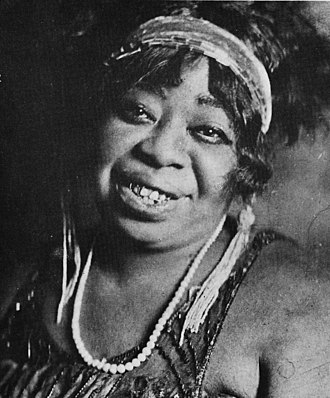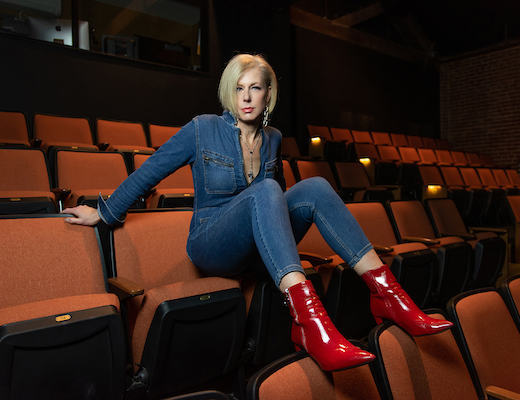By Jordan Ealey
This article was first published December 18, 2020 in DC Theatre Scene here.
Introducing the real Ma Rainey. Ahead of the premiere on December 18, 2020 of August Wilson’s play Ma Rainey’s Black Bottom, it is important for audiences to realize that Ma Rainey is not a fictional character born of Wilson’s imagination, but rather a massively popular singer who crossed musical boundaries.
Wilson himself was influenced by what he referred to as “the four B’s”: novelist Jorge Luis Borges, playwright and poet Amiri Baraka, visual artist Romare Bearden, and the blues. Using the blues as inspiration offers an incredible opportunity to engage one of its most important contributors: Gertude “Ma” Rainey. In her book, Blues Legacies and Black Feminism, Black feminist scholar and activist Angela Y. Davis writes that Rainey was “the person responsible for shaping women’s blues for many generations of blues women.”
Born Gertrude Pridgett, there is a dispute among historians over exactly when and where she was born (she herself claimed April 27, 1886 in Columbus, Georgia while other historians have claimed September 1882 in Russell County, Alabama). Nonetheless, it seems to be confirmed that she was born some time in the late nineteenth century in the Deep South. Rainey began her performance career in minstrel shows and vaudeville, like many of her fellow Black performers were forced to, due to the limited opportunities. Rainey recorded her first song “Back Luck Blues” in 1923. Though there are no definitive answers as to how Rainey was exposed to the blues (she both claimed that she was introduced to the style by someone else and that she herself created the term), she clearly amassed a huge following and advanced the genre forward.
Through Rainey was not the first Black woman to be recorded (that designation belongs to Mamie Smith and her song, “Crazy Blues” in 1920), her success as a performer earned her the title of ‘Mother of the Blues.’ After being “discovered” by music executive J. Mayo Williams in Chicago, Rainey signed with Paramount Records and went on to record over 100 songs. This proliferation of recordings catapulted her into unparalleled financial and critical success. Ma Rainey also toured with the Theater Owners Booking Association (knicknamed by those who toured, TOBA – “tough on black asses”). As demand to see this ‘Mother of the Blues’ grew, she performed before integrated audiences.
The blues provided Black women with the space, not available in other music, to express themselves freely. One of the most important (and sometimes overlooked) facts about Rainey as well as many blues women singers of the early twentieth century is their unapologetic expressions of queerness and sexuality in general. A lot of the performers, Rainey included, did not try to hide their sexual expressions. In fact, Ma Rainey’s “Prove It On Me” has lyrics that underscore queer sexuality: “Went out last night with a crowd of my friends/They must’ve been women, ‘cause I don’t like no men.”
Though Ma Rainey passed in 1939, her legacy remains. Rainey was inducted into the Blues Foundation’s Hall of Fame in 1983 as well as the Rock and Roll Hall of Fame in 1990. Her song, “See See Rider Blues” (1924) is in the National Recording Registry as well as the Grammy Hall of Fame.
Her life has also been dramatized in various cultural products; she has been portrayed by Academy Award-winning actresses such as Mo’Nique in HBO’s Bessie and now Viola Davis in Netflix’s Ma Rainey’s Black Bottom.Ma Rainey’s Black Bottom premieres on Netflix on December 18, produced by Denzel Washington. Tony-Award winner George C. Wolfe directs an all-star cast, starring Viola Davis as Ma Rainey and Chadwick Boseman as a member of Rainey’s band.





No Comments